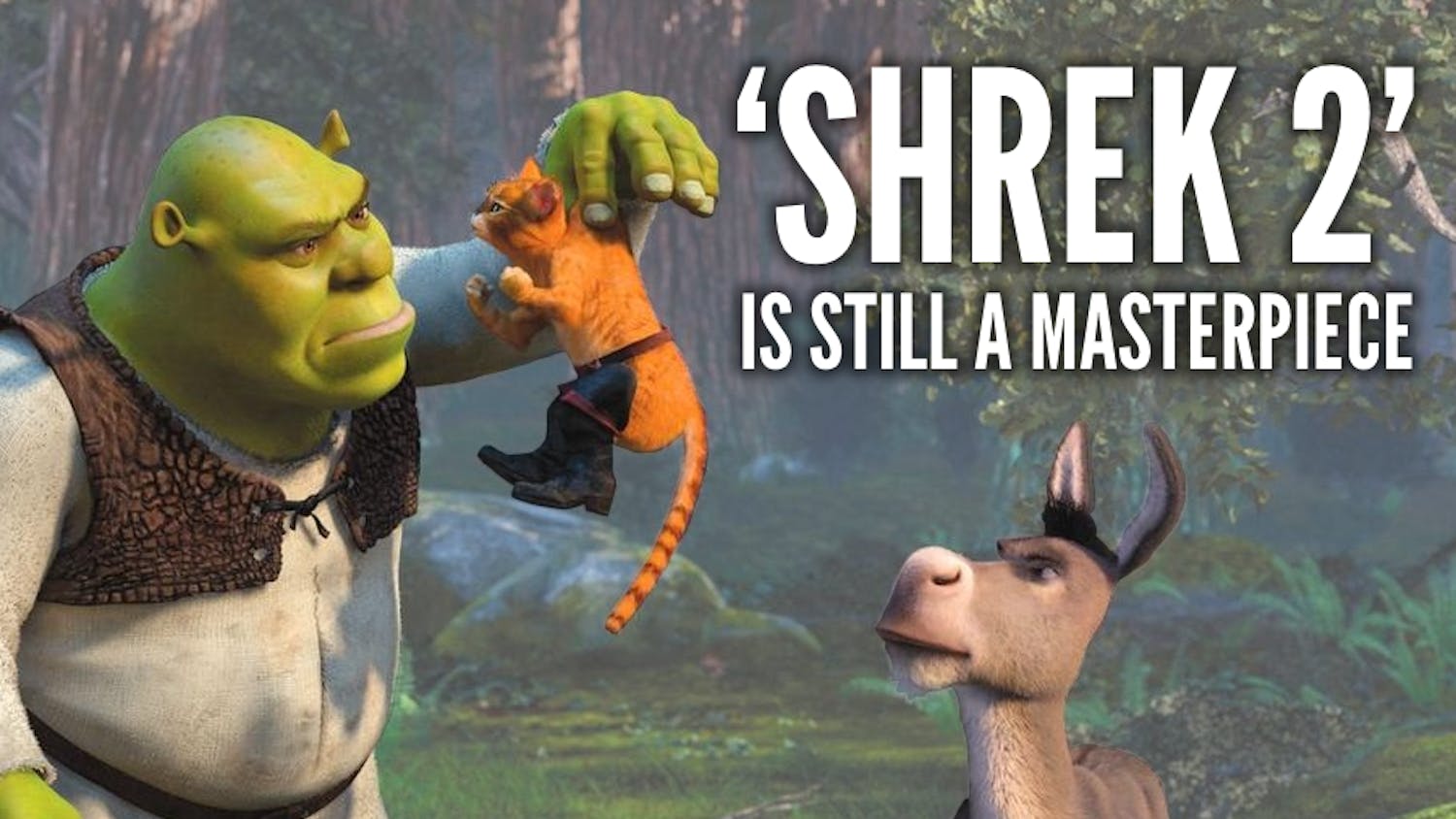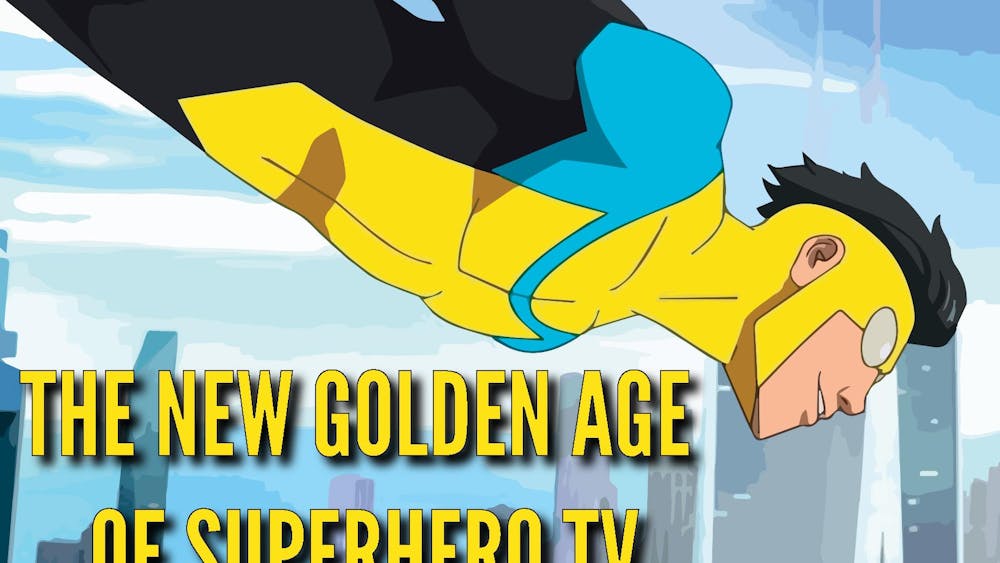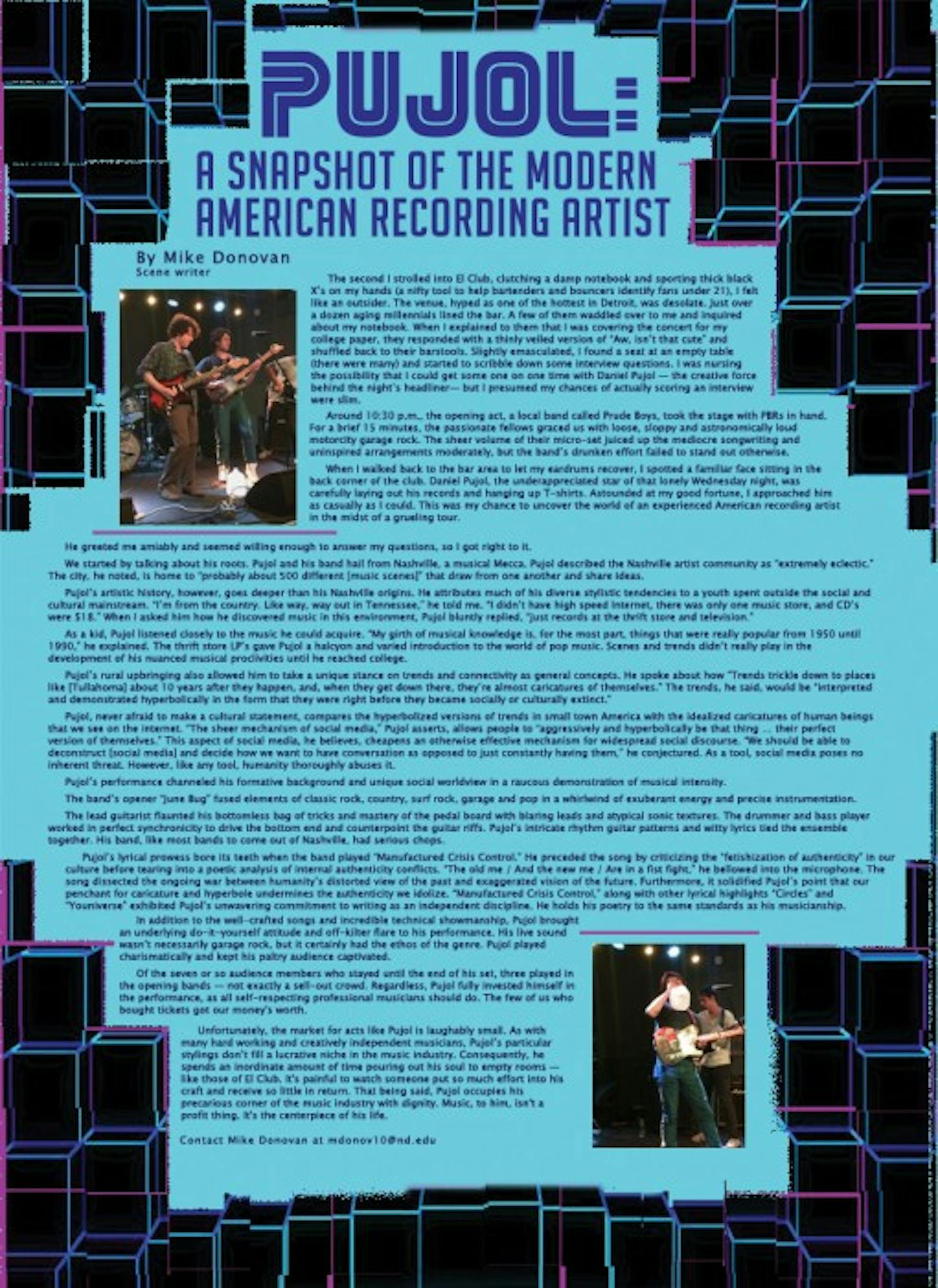
The second I strolled into El Club, clutching a damp notebook and sporting thick black X’s on my hands (a nifty tool to help bartenders and bouncers identify fans under 21), I felt like an outsider. The venue, hyped as one of the hottest in Detroit, was desolate. Just over a dozen aging millennials lined the bar. A few of them waddled over to me and inquired about my notebook. When I explained to them that I was covering the concert for my college paper, they responded with a thinly veiled version of “Aw, isn’t that cute” and shuffled back to their barstools. Slightly emasculated, I found a seat at an empty table (there were many) and started to scribble down some interview questions. I was nursing the possibility that I could get some one on one time with Daniel Pujol — the creative force behind the night’s headliner — but I presumed my chances of actually scoring an interview were slim.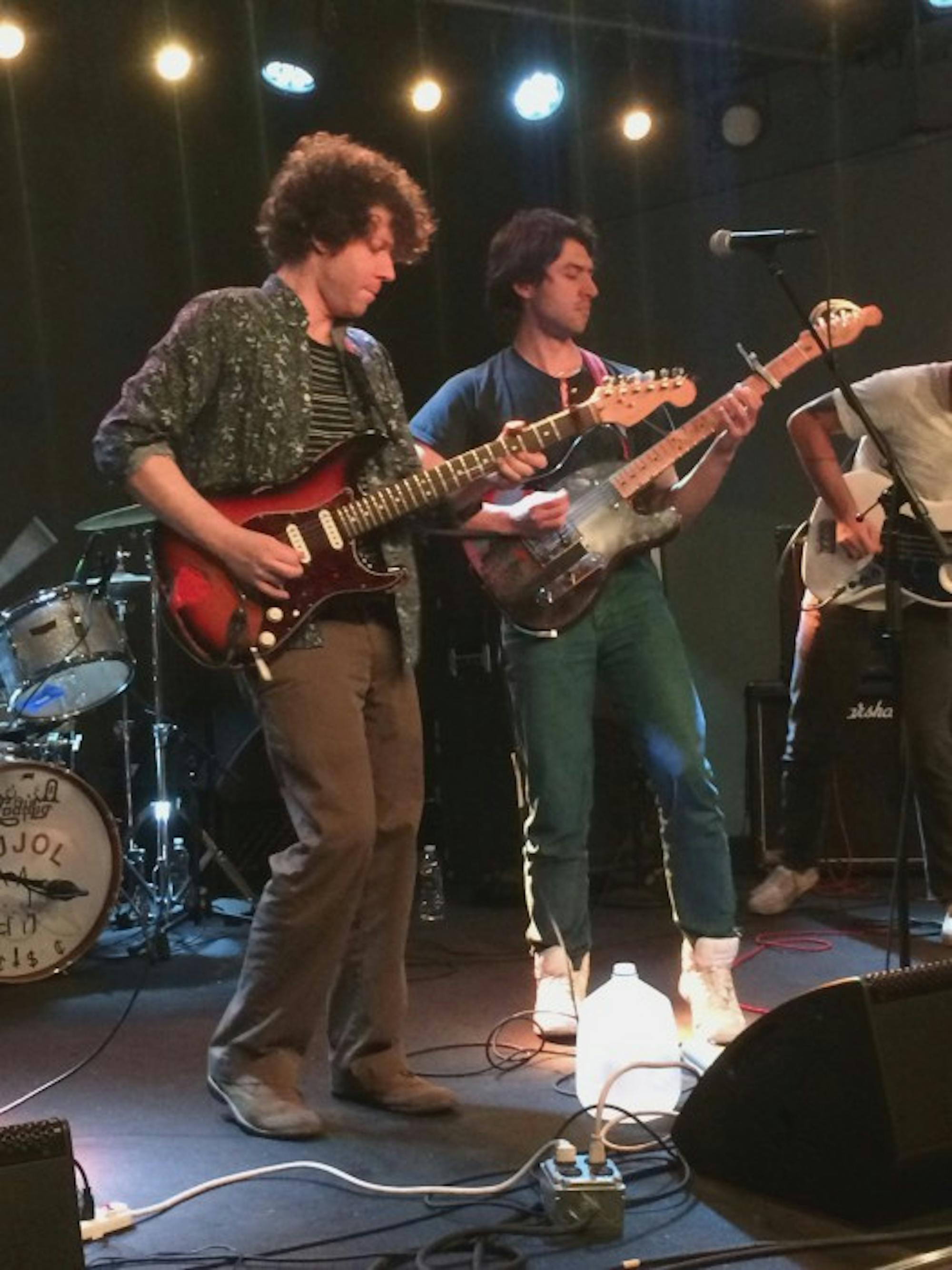
Around 10:30 p.m., the opening act, a local band called Prude Boys, took the stage with PBRs in hand. For a brief 15 minutes, the passionate fellows graced us with loose, sloppy and astronomically loud motor city garage rock. The sheer volume of their micro-set juiced up the mediocre songwriting and uninspired arrangements moderately, but the band’s drunken effort failed to stand out otherwise.
When I walked back to the bar area to let my eardrums recover, I spotted a familiar face sitting in the back corner of the club. Daniel Pujol, the underappreciated star of that lonely Wednesday night, was carefully laying out his records and hanging up T-shirts. Astounded at my good fortune, I approached him as casually as I could. This was my chance to uncover the world of an experienced American recording artist in the midst of a grueling tour.
He greeted me amiably and seemed willing enough to answer my questions, so I got right to it.
We started by talking about his roots. Pujol and his band hail from Nashville, a musical Mecca. Pujol described the Nashville artist community as “extremely eclectic.” The city, he noted, is home to “probably about 500 different [music scenes]” that draw from one another and share ideas.
Pujol’s artistic history, however, goes deeper than his Nashville origins. He attributes much of his diverse stylistic tendencies to a youth spent outside the social and cultural mainstream. “I’m from the country. Like way, way out in Tennessee,” he told me. “I didn’t have high speed Internet, there was only one music store, and CD’s were $18.” When I asked him how he discovered music in this environment, Pujol bluntly replied, “just records at the thrift store and television.”
As a kid, Pujol listened closely to the music he could acquire. “My girth of musical knowledge is, for the most part, things that were really popular from 1950 until 1990,” he explained. The thrift store LP’s gave Pujol a halcyon and varied introduction to the world of pop music. Scenes and trends didn’t really play in the development of his nuanced musical proclivities until he reached college.
Pujol’s rural upbringing also allowed him to take a unique stance on trends and connectivity as general concepts. He spoke about how “Trends trickle down to places like [Tullahoma] about 10 years after they happen, and, when they get down there, they’re almost caricatures of themselves.” The trends, he said, would be “interpreted and demonstrated hyperbolically in the form that they were right before they became socially or culturally extinct.”
Pujol, never afraid to make a cultural statement, compares the hyperbolized versions of trends in small town America with the idealized caricatures of human beings that we see on the internet. “The sheer mechanism of social media,” Pujol asserts, allows people to “aggressively and hyperbolically be that thing … their perfect version of themselves.” This aspect of social media, he believes, cheapens an otherwise effective mechanism for widespread social discourse. “We should be able to deconstruct [social media] and decide how we want to have conversation as opposed to just constantly having them,” he conjectured. As a tool, social media poses no inherent threat. However, like any tool, humanity thoroughly abuses it.
Pujol’s performance channeled his formative background and unique social worldview in a raucous demonstration of musical intensity.
The band’s opener “June Bug” fused elements of classic rock, country, surf rock, garage and pop in a whirlwind of exuberant energy and precise instrumentation. The lead guitarist flaunted his bottomless bag of tricks and mastery of the pedal board with blaring leads and atypical sonic textures. The drummer and bass player worked in perfect synchronicity to drive the bottom end and counterpoint the guitar riffs. Pujol’s intricate rhythm guitar patterns and witty lyrics tied the ensemble together. His band, like most bands to come out of Nashville, had serious chops.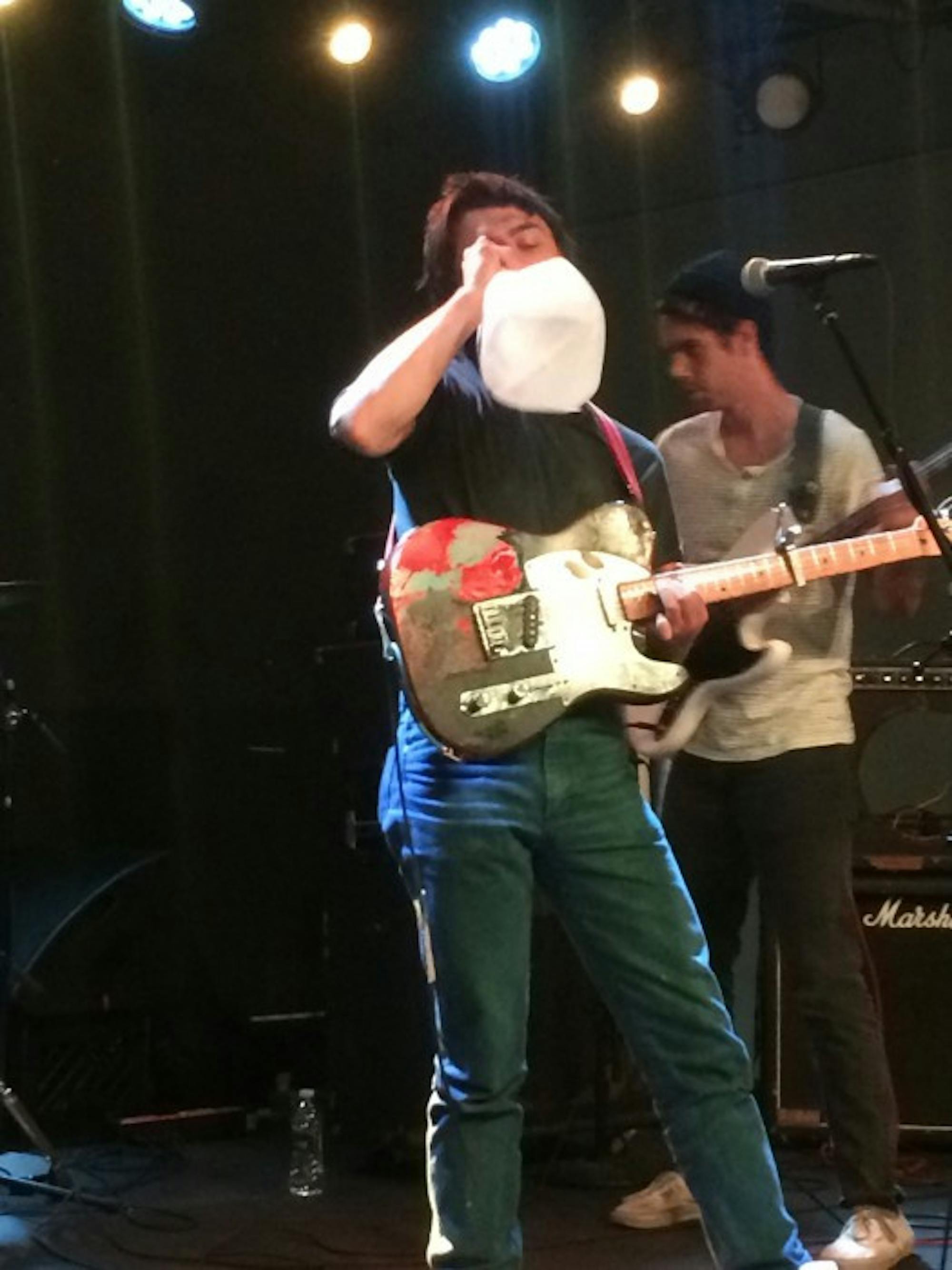
Pujol’s lyrical prowess bore its teeth when the band played “Manufactured Crisis Control.” He preceded the song by criticizing the “fetishization of authenticity” in our culture before tearing into a poetic analysis of internal authenticity conflicts. “The old me / And the new me / Are in a fist fight,” he bellowed into the microphone. The song dissected the ongoing war between humanity’s distorted view of the past and exaggerated vision of the future. Furthermore, it solidified Pujol’s point that our penchant for caricature and hyperbole undermines the authenticity we idolize. “Manufactured Crisis Control,” along with other lyrical highlights “Circles” and “Youniverse” exhibited Pujol’s unwavering commitment to writing as an independent discipline. He holds his poetry to the same standards as his musicianship.
In addition to the well-crafted songs and incredible technical showmanship, Pujol brought an underlying do-it-yourself attitude and off-kilter flare to his performance. His live sound wasn’t necessarily garage rock, but it certainly had the ethos of the genre. Pujol played charismatically and kept his paltry audience captivated.
Of the seven or so audience members who stayed until the end of his set, three played in the opening bands — not exactly a sell-out crowd. Regardless, Pujol fully invested himself in the performance, as all self-respecting professional musicians should do. The few of us who bought tickets got our money's worth.
Unfortunately, the market for acts like Pujol is laughably small. As with many hard working and creatively independent musicians, Pujol’s particular stylings don’t fill a lucrative niche in the music industry. Consequently, he spends an inordinate amount of time pouring out his soul to empty rooms — like those of El Club. It's painful to watch someone put so much effort into his craft and receive so little in return. That being said, Pujol occupies his precarious corner of the music industry with dignity. Music, to him, isn't a profit thing. It's the centerpiece of his life.



